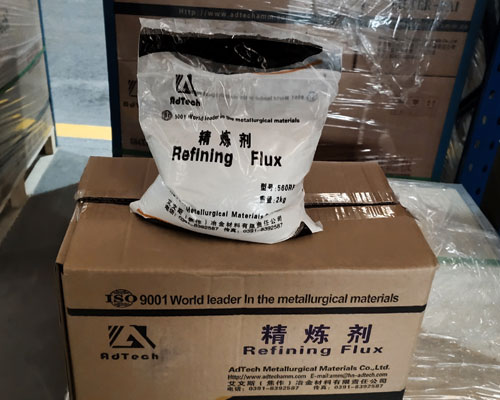Molten aluminium refining agent is a compound added to the molten aluminum bath to improve the quality of castings. They are mixed for specific processes and application areas. Flux helps in surface protection, scum treatment, furnace wall cleaning, metal cleaning, hydrogenation and crystal refinement.
Aluminum alloys inevitably absorb and carry gas during the melting process, which can lead to a series of defects such as holes, shrinkage cavities and holes, cracks and leakage, and high purity of the casting. This will reduce the alloy content and affect the quality.
Therefore, it is necessary to refine and purify the aluminum alloy through a smelting process to eliminate these gases and aluminum dross, improve the quality of the aluminum alloy, and add a molten aluminum refining process to the aluminum alloy. Purification is a routine measure.
After refining and mixing molten aluminum and molten aluminum, the hydrogen content can be reduced and non-metal oxides can be removed. If the operation is improper, the refining agent will be consumed and expensive, and it will also cause environmental problems and waste of aluminum ash inclusions after production.
Characteristics of Molten Aluminium Refining Agent
1. Use nitrogen to blow the refined agent into the aluminum melt and refine it. The impurity removal effect is good, the degassing capacity is high, and the consumption is low. Without using online degassing device, the hydrogen content can be reduced to about 0.10~0.15ml/100gAl.
2. The refining agent does not chemically react with the furnace lining, controls the heating effect, reduces the loss, and reduces the oxidation burnout rate of aluminum by more than 30%, and the output of aluminum slag is reduced by 50%.
3. The magnesium nitride added to the refined preparation has a strong ability to crush and dissolve alumina, and it can react with alumina.
4. The structure of the aluminum alloy round ingot melted by the refining agent is uniform, and there are basically no defects such as loosening, slag inclusion, etc., which improves the uniformity and fineness of the internal structure of the aluminum alloy round ingot. In terms of increasing the grain size, improving the quality of post-processed aluminum extruded alloy profiles and improving the processing performance, the yield of aluminum alloy round ingots has increased from 95.5% to 98.5%.
5. It can effectively remove small-sized oxide inclusions, and the affinity is obviously improved.

